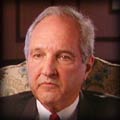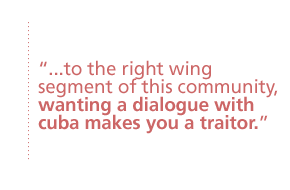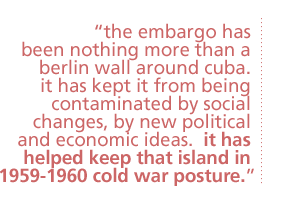

 |


He is the former president of the Bay of Pigs Veterans Association but says he
was thrown out of it because its members considered him a
díaloguero, someone who wants to establish a dialogue with the
Cuban government.
Duran is now a board member of the Cuban Committee for Democracy, an organization
founded in 1993 by the moderate Cuban-American community. |  |
Are you still active in the Bay of Pigs Association?
I was president of the Bay of Pigs Veterans Association for two years in a row,
and I continued to be active in the association until approximately four or
five years ago, when I was more or less thrown out of the association for being
what the Cuban community calls a "dialogado," which is a person who wants to
establish a dialogue with the Cuban government to bring about a transition
towards democracy in Cuba. To the right wing or more conservative community
here in Miami, a dialogado is the worst thing that you could be called. It
implies that you're a traitor.

But you were pretty right wing. . . .
I was pretty conservative, pretty right wing. You have to remember that, in
the 1960s and 1970s, I, as most of the Cuban-Americans or Cubans who were here
in Miami, was working within the context of the Cold War. We really became a
part of the confrontation between the Soviet Union and the United States and,
as such, we became very, very conservative, and very, very right wing. I
started changing in the 1980s when I saw that we were getting to a stage where
Cuba needed a transition that was peaceful without confrontation. I no longer
believed that Cuban-Americans should invade Cuba. I no longer believed that
Cuban-Americans should kill other Cubans. I believe that we should work
towards a transition.
But I did not make the decision to come out and be very open about it until the
demise of the Soviet Union. When the Soviet Union disappeared, I came to the
conclusion that, for the first time in the history of Cuba, Cuba could act
independently of the influence of any foreign nation. In the beginning it was
Spain, then it was the United States, then it was the Soviet Union. This
particular moment in time was too precious not to take advantage of it. We
would never achieve our own political and social maturity until Cubans were
able to resolve their differences by themselves. So I became very active in the
process of advocating for a dialogue with the Cuban government.

What did you then expect from the United States?
Cubans lived under the absolute certainty that the United States would not
allow a communist government to exist within 90 miles of its coast. Like most
of the Cubans, we believed that the United States would take some kind of
action to either invade Cuba or destabilize the Cuban government. We firmly
believed that.
Looking back, of course, it did not happen. Now, I'm glad that it did not
happen. It would have been very bad for the United States government to invade
Cuba. It would have been very bad if the United States government destabilized
the government in Cuba, the way that it was done in Guatemala and in other
countries in Latin America, which essentially retarded the whole maturation
process of those countries. The Cuban government has got to evolve, and it's
got to change because of the activity of we Cubans, not of any foreign power.

 Are many Cubans still waiting for the US to intervene?
Are many Cubans still waiting for the US to intervene?
This whole sector of the more conservative community does. But they're wrong,
because the United States will not invade Cuba. The United States is going to
do what's in the best interest of the United States, and rightly so. That is
what all great powers do. What we Cubans must do is make sure that we don't
depend on anybody to resolve what is in our own best interest. And I don't
think any activity that is sponsored by any foreign power is in the best
interest of any nation. We have to resolve it by ourselves.

Is there a sense of betrayal over Elián?
The Elián case was a misjudgment from the very beginning. The Cuban
community here in Miami, especially the more conservative part, took on a fight
that they really never had a chance of winning. And it really never had
anything to do with the welfare of that child or getting rid of Castro. It was
all about political power here in the United States, especially Dade County.
They thought that they could bully their way through this thing and keep
Elián here against everything that was logical, against everything that
was morally right, against all the laws. They thought that, because they had
the power, they were going to be able to do it.
The only winner that has come out of this is the government of Cuba, because it
has been shown to the whole world how intransigent, how completely arrogant the
Cuban-American community has become. That has made them lose a great deal of
influence and a great deal of power in the United States.

What do you mean by "their political power here?"
They've been able to stifle most legislation, most political activity, that has
had any inclinations of normalizing relations with Cuba. They've been able to
influence Congress and the administrations to create legislation like the
Torricelli bill, the Helms-Burton bill, which basically try to strangle the
Cuban economy. In fact, what it's strangling is the Cuban people. It has made
the Cuban government stronger. It has made it look like the United States have
been bullying the Cuban government. It has given it tremendous support
internationally.
They've been able to achieve that because they had political power, and because
the rest of the country really didn't care much about what's happening in Cuba.
They said, "That's a Cuba issue, let's leave it to the Cubans, let's leave it
to the best judgment of the two or three Cuban people in Congress."
In this Elián case, this whole thing has come unraveled. The United
States and other countries have, for the first time, focused once again on Cuba
and on the Cuban problem. And what they have seen is that the US policy
towards Cuba for the past 40-some years has not worked, is not working, and it
will not work in the future. It has shown is that the Cuban community here in
Miami, a segment of it, is very irrational and is very arrogant.

Is it a struggle for power right here in Miami?
It's a complex thing. Most of the Cuban-Americans--the normal people, the
people who are not into the power-brokering aspect of Cuba policy--really have
a gut feeling against the Castro government, especially those who have lost
properties in Cuba or those who have had their relatives either shot or in
prison because of the Cuban government.
But to the leadership, it's a combination of things. They would love to see
Castro toppled, but they have a great interest in having political and economic
power here in the United States. And that is the driving force between this
dilemma that is going on, especially right now. A lot of the Cuban-American
community is realizing that this struggle has maintained the status quo in
Cuba. Many, many people believe that the past leaders are really after
self-interest, not what's in the best interest of the nation of Cuba and the
Cuban people.

So is it a struggle about Cuba and about power.
It started out as being a struggle about Cuba. It's now being shown to be a
struggle for power here in the United States. It's obvious, because the whole
stance that has been taken in this past 30, 40 years has only served to
maintain the government of Cuba as it is. The embargo has been nothing more
than a Berlin Wall around Cuba. It has kept it from being contaminated by
social changes, by new political and economic ideas. It has helped keep that
island in 1959-1960 Cold War posture.

 What were the interests of the different parties in the fight for
Elián?
What were the interests of the different parties in the fight for
Elián?
Some of the more conservative segments of this community were seeing that there
was change coming about--people like George Schultz and Kissinger were saying
that there should be a commission set up to review and to make changes on Cuban
policy. [So] the more conservative segments of this community were seeing Cuba
policy being attacked from all over the place. And they thought that the
Elián case would be a good moment to try to reinforce their influence in
Congress and in the administration. They thought that they could swing it, and
they thought that, by swinging it, then Elián could stay. They could
show how much influence and how much power, politically, they had. It
backfired. What it has really done is has shown how little power they have.

How did they get so much attention?
Elián became a very, very emotional issue for many people. It had
religious significance to some people. They said that he was found floating
in an inner tube, that there were dolphins protecting him. Many people compared
him to somebody that had been sent by God to lead us in the fight against
Castro. Elián became a myth to many people. If you remember the scenes
around Elián's house, you find that there were Catholic groups praying,
that there were Protestant groups praying, that there were even Santeria
groups. They all found some religious significance.
Elian was a very attractive young kid with a great personality, and this
became a very sentimental issue to many, many Cubans. It became a natural for
a show of force. They could manipulate and they could mobilize a segment of
the Cuban community here, and they could send a message that they thought would
catch on with Congress.
What they failed to see was some of those very allies in Congress, Republican
conservatives, had an agenda of family values, and that this country had a
great appreciation for the rights of a father and a family over their son.
They did not count on that fact, and that is what this country was really
seeing. That, coupled with this whole circus atmosphere that happened here,
really turned this whole country against the Cuban-American community.

And when the government, almost everyone seemed to turn against the Cuban
Americans on this issue, what was their reaction?
They felt abandoned once again. You have to understand--in the whole psyche of
the Cuban conservative movement, Elián is almost like the Bay of Pigs.
Lots of the Cubans believed that the Bay of Pigs was lost because the United
States did not invade and left us in that beach over there completely by
ourselves. Elián is the first time that the Cuban community here in
exile has come to that same realization--"The United States has once again
abandoned us."
They didn't take into consideration that that is the law of this country. They
went to federal court to challenge the immigration law, which was established
by the 1996 Immigration Reform Act. And they lost, because the attorney general
and the Immigration Department have the authority to make the decisions that
they did. They went ahead anyway, in spite of the law, believing that they
could finesse it and have enough power. All of a sudden it dawned on them that
they were losing public opinion because of the morality of the issue, and they
were losing in court because the law was against them. They felt devastated.
They felt abandoned, when in fact they were not. The courts were following the
law, and it's normal for people to believe that a child should be with her
father.

What happened when the attorney general came here?
One of the most interesting things that has happened with the Elián case
is that, for the first time in 40 years of Cubans activity here in Miami, the
Anglo community and the black community reacted against the Cubans. At the
beginning, some of the people were saying that this is a racist reaction. The
reaction is not because of racism. The reaction is because you have people on
TV cameras saying the attorney general has to come and get Elián over
their dead bodies. They're calling President Clinton and Attorney General
Janet Reno all kinds of names. They were given an order to take the child to
the airport and they came on television and said, "We're not taking him to the
airport."
The reaction is not a racist reaction. It's a reaction against the arrogance,
and it's a reaction against that complete disregard for the law. It's a
reaction against challenging the federal government in the streets. You can
challenge the federal government of the United States in Congress, or you can
challenge them in the courts, but you can never challenge the authority of the
federal government on the streets. And that's what these people were doing.

You've been to Cuba?
Yes, I've been to Cuba twice. The first time I went to Cuba was since I was
released from the Bay of Pigs invasion. It was a very emotional thing. I had
been believing for all these years that the only way I would ever get back to
Cuba was in the revolution or invasion or some kind of real traumatic
experience. And when I arrived in Cuba I felt like I had never left.
Everything was as if I had been there all my life. I got adjusted in two
minutes flat. I knew every place that I was going. The people treated me very
well. I felt that I was at home, and that is an enlightened realization. I
felt really good. The first time I spent seven days, and I traveled all over
Havana. I went to visit the house where I was born and raised.

You went back to the Bay of Pigs?
I went to the Bay of Pigs. The person who took me to the Bay of Pigs was a
veteran of the Bay of Pigs on the other side. He had been an officer who
fought against the brigade. It was a very interesting experience, because when
we started out, the man felt like he hated me. He felt that what he was going
through was demeaning--to be a guide to what they call a mercenary down in
Cuba--someone who had fought against the revolution and had fought against him
at the Bay of Pigs.
I kept trying to make conversation with him, but I could not get him to relax.
I could not get him to ease up. At one point, he told me that he had a pain in
the back, and I told him I had some Tylenol with me. He says, "No, no, I don't
need Tylenol." And we kept on that way. And it was just a very cold
relationship through the whole trip, until we got to a little town called San
Blas. After we got to that town, I told him, "This is where I was fighting for
three days," and he told me, "This is where I was fighting for three days
also." We were both fighting against each other in San Blas for three days.
We started comparing war stories. And all of a sudden, the ice completely
melted and we started talking like two war companions, let's say. After we
finished that conversation, I said, "Why don't you let me buy lunch?" He says,
"Okay, buy me lunch, but also give me a Tylenol." And we started talking, and
we became real friends, let's say.

People to people . . .
A people-to-people exchange. That's what it's all about, and it works.
You break the ice. Then all of a sudden, you realize that everyone
is just normal, and there's no need to hate anybody.

Are you considered a traitor?
No. Well . . . people know me well enough to know that I'm not a traitor.
Some of the right-wing segments here call me a dialogado, and a dialogado is
considered a traitor. Everybody else in the world would think that a
dialogado, which means that you want a dialogue, is a very intelligent person
and a very sensible person. But no, to the right-wing segment of this
community, wanting a dialogue with the Cuban government and wanting to see
things change peacefully--that makes you a traitor.

home · analyses · interviews · timeline · discussion
video excerpt · links · readings · synopsis
tapes & transcripts · press · credits
frontline · wgbh · pbs online
web site copyright WGBH educational foundation
top photo © afp/corbis
 |  |